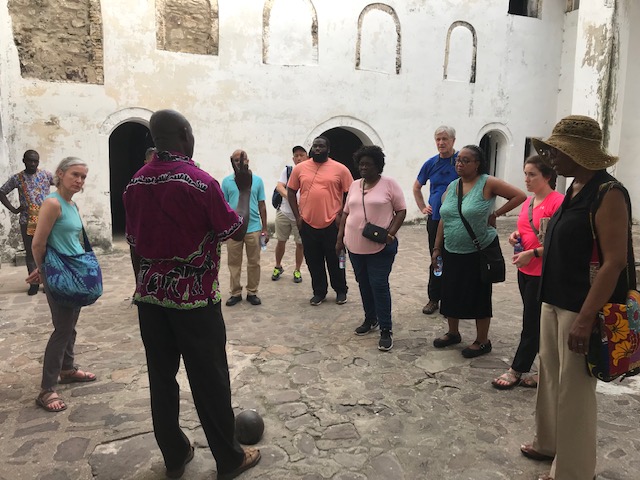Ghana Travel Seminar: Elimina Slave Castle

BY MELVINIE LEWIS
Elimina castle is the largest of 52 castles along the Gold Coast used to house and deport African slaves to the Americas, Europe, and the Caribbeans. It has stood for some 530 years. Built by the Portuguese, taken by the Dutch, sold to the British, and relinquished to the Ghanaians in 1957 when they gained their independence.
There were some three million Africans captured for shipment through Elmina. Of the three million, 1/3 were killed in the forest and lands surrounding Elmina for resisting, 1/3 perished at the castle or at sea, and 1/3 arrived in Europe, Caribbeans, and/or the Americas to be sold. We toured the dungeons where the African women and African men were held until deportation. Deportation took weeks and sometimes months before a ship arrived to take them away. In the dungeons there was very little light and very little air; the Africans were fed little food (corn, rice, brown bread). In the dungeons the Africans slept on near brick floors, they were forced to live in feces, urine, vomit, and blood. They were treated even more inhumanly (locked in cells with no food, light, water, or air until they literally died) if they resisted or were unruly in any manner. Once dead they were removed from the cell and tossed into the ocean like a piece of garbage. Some of the women were raped by the governor and his men. These are just a few of the atrocities they faced. When the ships arrived they were herded like animals through what is called “the door of no return,” loaded onto ships, and sailed away.
Later in the 1990s the local chiefs came together and posted a plaque at the castle offering an apology to the Africans of the diaspora; the TransAtlantic slave trade.
Melvinie Lewis is a Master of Divinity student at the Richmond campus of Union Presbyterian Seminary.








